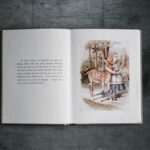
With star translators working on the writings of visionary Korean poets, more fantastic Korean poetry in translation is regularly becoming available. This post features six Korean poetry collections in translation written by both twentieth-century luminaries and contemporary standouts. Add some lyrical energy to your life with these six books that will captivate, challenge, and ignite your poetic spirit.
Phone Bells Keep Ringing for Me by Choi Seungja (trans. Won-Chung Kim & Cathy Park Hong)
Don Mee Choi calls Choi Seungja “one of the most influential feminist poets of South Korea,” and the collection Phone Bells Keep Ringing for Me gathers together poems from Choi Seungja’s long literary career. Through the poetry in this collection, Choi contemplates her experiences of marginalized solitude in an endlessly disappointing patriarchal and capitalist world.
One of Choi Seungja’s main poetic concerns is the existential experience of loneliness that faces an unmarried woman poet without a child in South Korea. This is a situation that, according to translator, poet, and essayist Cathy Park Hong, has rendered Choi “an aberration.” In the collection, Choi recognizes that she is alive, but, taking stock of her circumstances, she asks: in what manner and for what purpose?
Choi’s approach to these questions are complicated by her non-binary treatment of life and death. Mike Corrao locates within Choi’s work a “chthonic poetics,” an interpretation that ties Choi’s aesthetics to her destabilizing treatments of life and death. While the poet fixes her gaze upon her personal journey of dying, she also recognizes that both natality and life depend upon decay and expiration, like “mold formed on stale bread” or “a maggot-covered corpse.”
Choi harnesses images of abject decomposition like these to gesture towards other forms of living, and she furthermore poeticizes images of bodily excretions and waste. According to Marie Myung-Ok Lee, “Korean poetry is often marked by the pastoral, and poetry by women comes with expectations to be lyrical and decorous in subject. Choi, then explodes that idea.”
As a work that, in Cathy Park Hong’s words, confronts “the existential despair of living in a hierarchical society where free will is a joke,” this book with a feminist, anti-patriarchal, anti-capitalist bent provides much to mull over.
Unexpected Vanilla by Lee Hyemi (trans. Soje)
Lee Hyemi’s Unexpected Vanilla is a shifting collection of poetry that is surreal and erotic. In Joanna Lee’s words, it “[operates] on an unstable, sticky, dream-like logic,” and throughout the collection, material forms and the ideas they evoke are transient.
This is partly because Lee Hyemi’s poetry drips and flows with liquids of different viscosities, from juices, to water, to bodily fluids. Lee’s eroticism often expresses itself through these fluid images, but her symbolic poetics also accesses solids and gases in addition to liquids as they commingle and undergo phase transitions into and from one another.
Fittingly, in an interview with the translator Soje, the poet asks: “Isn’t it good for the parameters of normalcy, what is considered obvious, what is ‘vanilla,’ to later become totally unreasonable and unimaginable?” This speaks to what Johannes Görensson calls Lee’s “queer ecology.”
In Lee’s work, plants and body parts evoke the whole human body, but they never quite collapse into one-to-one metaphors or metonyms. The botanical furthermore effuses Lee’s language with multivalent sensations and tastes: fruits, flowers, seeds, and whole plants play with and entangle synecdochic body parts. The mouth in particular—which accrues special significance as a symbol of orality—is often as metaphorical as it is physical as it speaks, eats, and kisses.
The American Literary Translators Association recently recognized Lee Hyemi and translator Soje by shortlisting Unexpected Vanilla for the 2021 National Translation Award in Poetry. Pick up this collection for flowing poems that burst with sensual flavors and queer vibes.
Pillar of Books by Moon Bo Young (trans. Hedgie Choi)
In Moon Bo Young’s Pillar of Books, the poet playfully investigates the limits of human pursuits of knowledge and certainty. Whether dealing with math and science or history and poetry, Moon demonstrates that our dependence upon language subverts our desires for final answers. In this collection, the capacity to know—much less communicate—the Truth is thwarted by the slippery nature of language and signs.
Even mathematical languages are prone to slippage. Moon poeticizes and personifies algebraic and geometrical formulations, which simultaneously unmoors abstract concepts—like the hypotenuse of a triangle or the “a” in a2 + b2 = c2—from theorematic truths and imbues them with a sense of wondrous strangeness.
The humanities are no less prone to good-faith inaccuracies. Writers and artists like Kafka and Dalí are treated as figural characters more than real historical people. And as a work of poetry itself, Pillar of Books stages the hermeneutic ambiguity that pervades the minds of readers as they interpret literature and the minds of writers as they create literature. Making this uncertainty quite immediate, the relationships between sentences, phrases, and thoughts aren’t always clear in Moon’s work.
Pillar of Books won Moon the Kim Soo-young Prize in 2017. Even as the collection approaches the Big Questions of death and god, it doesn’t attempt to confine them within the limits of reason and logic as it opens up considerations to the promising potentials of unreason and illogic.
Yi Sang: Selected Works by Yi Sang (ed. Don Mee Choi; trans. Jack Jung, Sawako Nakayasu, Don Mee Choi, & Joyelle McSweeney)
Yi Sang (1910–37), a poet, architect, and painter, grew up and lived in Japanese-occupied Korea. He was imprisoned by the Japanese police for thought crimes before he died from tuberculosis at the age of 26. Before his early death, Yi Sang left behind a literary oeuvre that has been hailed as the most significant of modernist and avant-garde writing from Korea’s colonial period.
In this work, a team of translators have teamed up to share Yi Sang’s poetry in English. Each of the translators concentrates on specific parts of Yi Sang’s work: Jack Jung translates Yi Sang’s poems and essays in Korean; Sawako Nakayasu, his Japanese poetry; and Don Mee Choi and Joyelle McSweeney, his stories. Original contributions by the translators also provide historical, literary, and (auto)biographical contexts that tie Yi Sang’s poetics to political concerns, namely the poet’s engagements with Japanese colonialism.
Yi Sang’s poetry is remarkable for its formal creativity, and the collection includes images that allow the reader to see how the poems were originally printed. Jae Won Edward Chung notes that these exhibit optical and typographical patterns in Yi Sang’s poems, patterns that disorient the reader and indicate ruptures and breaches among and within languages.
Reviewers Chung, Katherine Beaman, Spencer Lee-Lenfield, and Colin Leemarshall all also highlight the thematic significance of mirrors in Yi Sang’s poetics. Mirrors suffuse the form and content of the collection with sly considerations of self-reflexivity, doubling, alienation, and (a)symmetry.
Reviewers attribute Yi Sang’s unique style—with its experimental forms and perplexing arrangements of signs and images—to his amalgamation of East Asian poetics with modernist French and German aesthetics of the Dadaist and Surrealist persuasions. E. Tammy Kim reasons that “[Yi Sang’s] choice of style might also have been the best way to transmit empire’s nightmares while evading the imperial censors.”
So, if you’re looking for a collection that’ll have you thinking about the political dimensions of aesthetic innovations, check out this significant contribution to Korean literature in translation to dive into the poetry of one of Korea’s most dazzling modernist writers.
Catcalling by Lee Soho (trans. Soje)
Lee Soho’s Catcalling is a poetry collection divided into five formally distinct sections that, through irony and sarcasm, tackles misogyny, patriarchy, and the psychological and physical abuses perpetrated against women.
The collection features the character Kyungjin, the protagonist of sorts of the poetry collection. Through scenes from Kyungjin’s and other women’s lives and memories, Lee frankly depicts and poeticizes men’s abusive tactics to maintain patriarchal control.
These range from physical violence to crass uses of misogynistic language, encompassing both violent verbal abuse and catcalls. The spotlight that Lee shines on the languages of masculinist domination exposes the vile, suffocating oppression they perform as well as their sheer ridiculousness.
Lee’s poetic examinations of misogynistic culture and language are expansive and take on the social dynamics that infect private domestic spaces as well as the more public literary world. While misogynist violence can erupt from strange men in public, Lee makes clear that men in close quarters—whether they’re family members or lovers—enact a particularly insidious form of misogyny through gaslighting and the corrosive force of repetitive violence.
Poet Lee Soho won the Newcomer Award in Modern Poetry in 2014. In this work, she moves through a glocal examination that brings together the concerns of South Korean women with feminist aesthetics through world art history. Lee’s poetic vision offers readers an incisive feminist lens to take on the patriarchy during the global age of the #MeToo movement.
The World’s Lightest Motorcycle by Yi Won (trans. E. J. Koh & Marci Calabretta Cancio-Bello)
In the poetry collection The World’s Lightest Motorcycle, the poet Yi Won reaches into quotidian moments of observation to touch upon the subtle and profound. This English translation of Yi’s work includes the collection When They Ruled the Earth (1996) as well as The World’s Lightest Motorcycle (2007).
As Mia You points out, Yi’s work has examined with prescience the role of the technological in contemporary life. Yi writes that “People everywhere / walk with plugs suspended from their bodies” and also that “when you click my head an hourglass appears, a loading error.” In the internet age, these formulations speak to how our greater connectedness has led to greater isolation and to how user interfaces have come to mediate our experiences of ourselves.
In the same way that Yi’s poetic examinations of our everyday uses of technology lead to discussions of social and psychological import, Yi’s meditations upon mundane images of the everyday pivot on associational relationships to surreptitiously make their way to the existential.
On this note, Yi’s existential concerns often surface through considerations of time, shadows, and mirrors. Time acts as a medium of movement, and movement through shadows and mirrors opens up the proximate yet estranged worlds contained in umbral silhouettes and shining reflections.
According to Don Mee Choi, translators E. J. Koh and Marci Calabretta Cancio-Bello have “invented astonishing language for Yi Won’s subversive poetry.” Poems from this collection are provided in side-by-side Korean-English translations, so readers with knowledge of both languages can compare the originals with their impressive renditions in English.
















